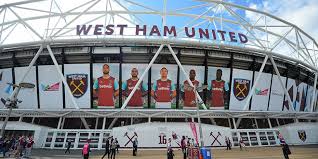By David Owen
January 29 – West Ham United, the East London club battling to avoid Premier League relegation, have become the latest English top-tier outfit to post a loss for the 2018-19 season.
The Hammers, who play runaway league leaders Liverpool on Wednesday night at the much-criticised London Stadium, reported a pre-tax loss of £28.2 million for the year to end-May 2019. This amounted to a negative swing of more than £46 million compared with the previous year’s £18.3 million profit.
The club, who recently entrusted one-time Everton boss David Moyes with saving their season, replacing Manuel Pellegrini, blamed the performance predominantly on “investment in the squad and subsequent rise in wage costs”, adding: “In the last four years the club has spent £214.4 million net on new players and has invested £22 million on infrastructure.”
While turnover at the corporate entity WH Holding Limited climbed more than £15 million to £190.7 million, staff costs jumped by not far off £30 million, from £106.6 million to £135.8 million. This resulted, in turn, in the widely-watched wage:turnover ratio rising from 60.8% to 71.2%. As recently as 2016-17 it had stood below 52%.
Interestingly, 2018-19 saw the club’s unnamed highest-paid director join the one-million-pound club. Emoluments for this individual were reported to have risen by some 26% from £898,000 to £1.136 million.
The combined balance of unsecured loans advanced by David Sullivan, the majority shareholder, and David Gold, his fellow director, remained at £45 million. Interest accrues at 4.25% a year and the repayment date is set at 1 January 2024.
According to the new accounts, interest accrued at the year-end of some £1.91 million was paid in full in late August. In addition, a £1 million payment was said to have been made to GGI International, a company related to David Gold, “in respect of a partial repayment of loan capital”.
West Ham said: “The payments referred to in the accounts are related to accrued interest on shareholder loans made to the club to reduce third party debt and its cost to the club. The loans aided the club’s long term stability. There was also a shareholder loan partial repayment to one of David Gold’s commercial interests.”
There is also a non-interest-bearing unsecured shareholder loan of £9.5 million. This is repayable upon a change of control of the group.
The accounts do not mince words about the importance for the club of keeping its Premier League status, describing its retention in 2019-20 as “an absolute necessity for the future wellbeing of the club”.
The problem for clubs like West Ham is that, while pressure on costs is relentless, Premier League broadcasting rights revenue is set to increase relatively little for at least the next three seasons, starting this year. Broadcast and central sponsorship distributions accounted for £127.4 million, or almost exactly two-thirds, of the Hammers’ 2018-19 turnover. Even if they win this latest relegation fight, therefore, a return to bottom-line profitability in the short term may not be straightforward.
Contact the writer of this story at moc.l1751524712labto1751524712ofdlr1751524712owedi1751524712sni@n1751524712ewo.d1751524712ivad1751524712

